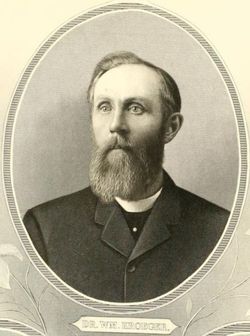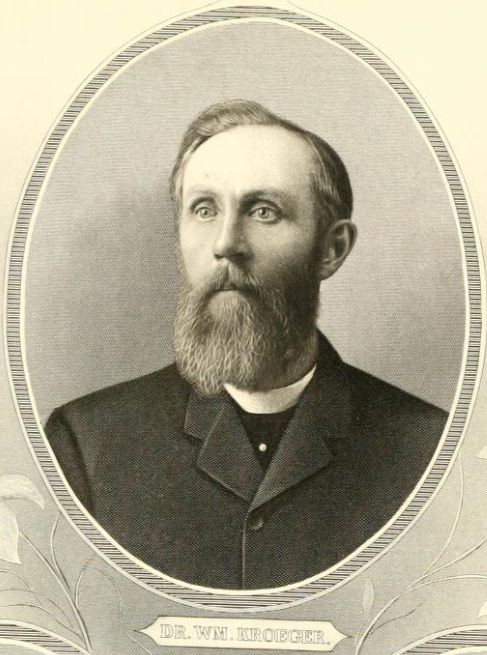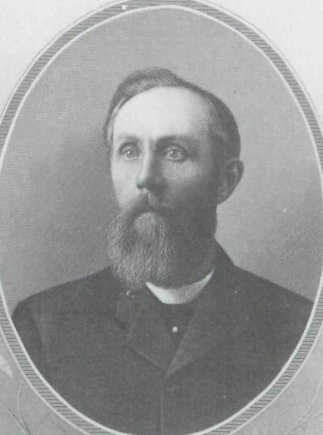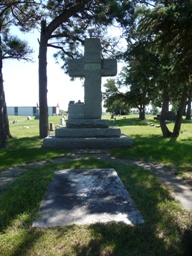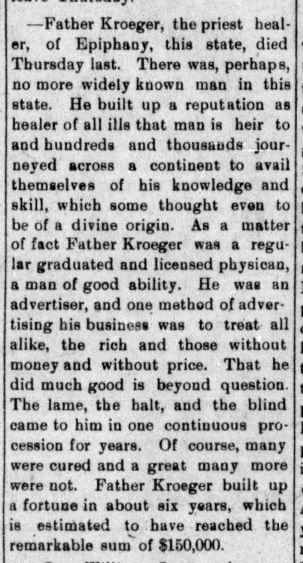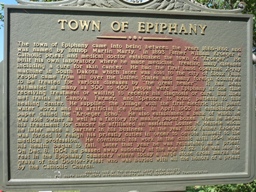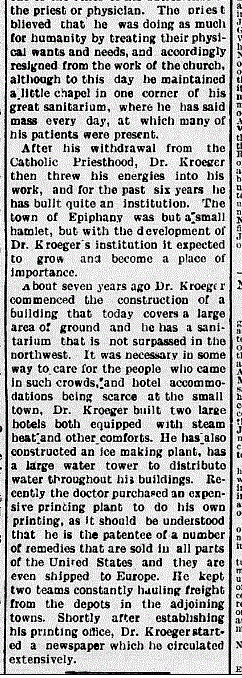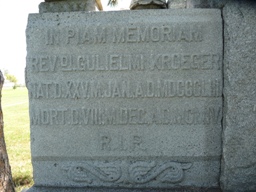While moving an x-ray machine, his hand received a large dose of x-ray radium. It was too much for his body to take and led to his early death. His assistant knew the formula for Kroeger's medicine, but she kept it secret after his death. When she died, so did his cure.
In 1975 a sign was erected in Epiphany, SD. It states as follows:
"The town of Epiphany came into being between the years of 1889 and 1892 and was named by Bishop Martin Marty. In 1883 Father William Kroeger, a Catholic priest and medical doctor, established the town "Kroeger." He built his own laboratory where he made medicine, treating many diseases, including a cure for skin cancer. He had the first hand-operated x–ray machine in South Dakota which later was sold to the city of Sioux Falls.
People came from all over the United States and many foreign countries. It has been estimated as many as 300 to 400 people were in Epiphany at one time, receiving treatment or waiting to receive his diagnosis or cure. Bus lines met trains at Canova, Farmer and Spencer to bring patients to this healing center.
He supplied the village with the first electric light plant, water works and an artificial ice plant. In April 1903, he established a paper called the "Kroeger Echo." He also established a bank of which he was sole owner as well as a factory for making paper boxes.
When he began his treatment for cancer, he affiliated an assistant, Louise M. Mentele, who he later made a partner in the business. In the year 1899, Father Kroeger was forced to resign his priestly duties in order to devote himself to the medical profession. He continued his work in the clinic until 1904 when his health began to fail. Later that year, he was reinstated as a priest.
On Dec. 8, 1904, he passed away suddenly at the age of 52. He was laid to rest in the Epiphany cemetery where today a large stone cross marks the grave of the Doctor-Priest who was buried with all the honors of a priest by the Catholic Church."
Submitted by Find A Grave Contributor: P Gates
------------------------------------------------
Bio from "History of South Dakota" by Doane Robinson, Vol. II (1904), pp 1856-1857.
REV. WILLIAM KROEGER, M. D.-A unique and distinguished position is that occupied by the honored subject of this sketch, who is a member of the priesthood of the Catholic church, one of the leading physicians and surgeons of the state and one who has accomplished an admirable and noble work for the good of humanity in connection with both vocations to which he has given his attention and great ability. He is the founder, and virtual owner, of the attractive little village which bears his name, in Hanson county, and has there established a sanitarium and medical institution and hospital which have attained a wide and noteworthy reputation.
Dr. Kroeger is a native of the city of Cincinnati, Ohio, where he was born on the 25th of January, 1853, being the eldest of the eight children of August and Elizabeth (Sexton) Kroeger, both of whom were born in Germany, the former in Clopenburg and the latter in Westfald. They came to America when young and their marriage was solemnized in the city of Cincinnati, where for many years the honored father of our subject followed his trade, that of carriage painting. He is still living in the "Queen City," being seventy-four years of age at the time of this writing, in 1904, while his wife passed to the life eternal when the subject of this review was a child of two years and five months, having been a devoted member and communicant of the Catholic church, as is also her venerable husband, who is a man of sterling character and one whose life has been one of signal usefulness. Dr. Kroeger received his preliminary educational discipline in the parochial schools and other church institutions of his native city, and at the age of eighteen years was matriculated in the Ohio Medical College, of Cincinnati, where he completed the prescribed course and was graduated, with high honors, as a member of the class of 1871, receiving the degree of Doctor of Medicine. He was thereafter for three years engaged in the practice of his profession in Cincinnati, and in the meanwhile had determined to prepare himself for the priesthood of the church in whose ancient and inviolate faith he had been reared. He completed his divinity course in St. Meinrad, Indiana, and on the 26th of January, 1880, was ordained to the priesthood by Rt. Rev. Joseph Dwenger, of the diocese of Fort Wayne. His first parochial charge was in Elkhart, Indiana, but as his health had become impaired he entered a request that he might be sent to some other climate, and this led to his identifying himself with South Dakota, to which state he came March 25, 1893. Here he was placed in pastoral charge of the Church of the Epiphany, in Hanson county, twelve miles north of Spencer, and here he accomplished a most excellent work, infusing both spiritual and temporal enthusiasm and finally brought about the erection of the attractive church edifice, which is one of sixteen which have been built through his efforts. With the work of the church here he has ever since been closely identified, while the town of which he is the founder is built up about the church edifice, which was practically its nucleus, the postoffice bearing the name Epiphany, while that of the town is Kroeger. While still actively engaged in his sacerdotal duties here he continued his medical studies and also made many original researches and experiments in the line. Rt. Rev. Martin Marty, bishop of the diocese, became aware of the attainments of Dr. Kroeger as a physician and surgeon and in 1894 suggested to him the propriety of bringing his professional knowledge into requisition in connection with his pastoral duties in view of the impoverished condition of many of his people, and he thus carried the double burden of responsibility, the result being that he finally became convinced that there lay before him the maximum of duty in relieving the physical suffering of humanity, for his reputation as a physician and surgeon soon far transcended local limitations and the suggestion of the church authorities was thus the direct cause which led to his retiring from the work of its priesthood to devote himself to the medical profession. He had given special study to thc treatment and cure of diseases of neurotic order and those peculiar to the female, and in the great sanitarium which he has established particular care is given to the treatment of cases of these orders. His latest discovery for the treatment of epilepsy, St. Vitus dance, nervous debility, consumption, kidney disease, catarrh of the stomach and cancers, through which he has accomplished wonderful results, has brought him into recognition throughout the entire medical world. He has in his finely equipped laboratory three of the largest X-ray machines, of his improvement, in the state, and in 1903 his sanitarium had patients from every state in the Union and all over the world. In August, 1899, Dr. Kroeger tendered to the bishop his resignation as rector of the Church of the Epiphany, and this was accepted by that prelate in the following month, since which time Father Kroeger has given his entire attention to his professional work and the management of the various institutions which he has established in the town which bears his name. His allegiance to the church remains of the most devoted order and in his professional work he draws no denominational lines, giving the benefit of his services and great abilities to all who come to him for succor from pain and suffering. He is imbued with that deep humanitarian sympathy which transcends mere emotion to become an actuating motive, and thus his work as a physician is certain to be the more potent and far-reaching. The location of Epiphany is well chosen, being on the height of ground between the Big Sioux and James rivers, while from the town the land slopes gently in all directions, making the site an ideal one both in matter of beauty and sanitary conditions. The town is known as Kroeger and is situated ten miles from Canova, which is on the Chicago & Northwestern Railroad, and twelve miles from Spencer, on the Omaha division of the same road. Dr. Kroeger started the town without funds and has today an investment representing fully two hundred and fifty thousand dollars. The population at the time of this writing is about one hundred and fifty people. and the town has besides its large and finely equipped sanitarium, two good hotels, a drug store, two general stores? hardware establishment, grocery, livery, lumber yard, etc., all being under the direct superintendence of Dr. Kroeger. The village is supplied with electric lights, water-works and artificial ice plant, while in April, 1903, the Doctor established a weekly newspaper, the Kroeger Echo, installing a fine modern plant for the purpose. In 1900 he established the Bank of Kroeger, of which he is president, cashier and sole owner, while in 1904 he also put into operation a plant for the manufacture of paper boxes, which he utilizes in connection with his medical preparations, this being the only factory of the sort in the state. He has made two trips abroad in recent years and took post-graduate courses in leading medical institutions on the continent. The Doctor is a man of gracious and genial personality, winning and retaining strong friendships and having the high regard of all who know him. He has great power of initiative, much administrative ability and, high intellectual attainments, so that he is staunchly fortified for the great work which he has undertaken, even as he was for that which he accomplished in his sacred office as a priest of the great mother church. It is a pleasure to the publishers of this history to include in the same this brief tribute to his labors and his noble character as a man and citizen. He has a great many employee and if it were not for him the people would have starved as he has always been willing to assist them in need.
While moving an x-ray machine, his hand received a large dose of x-ray radium. It was too much for his body to take and led to his early death. His assistant knew the formula for Kroeger's medicine, but she kept it secret after his death. When she died, so did his cure.
In 1975 a sign was erected in Epiphany, SD. It states as follows:
"The town of Epiphany came into being between the years of 1889 and 1892 and was named by Bishop Martin Marty. In 1883 Father William Kroeger, a Catholic priest and medical doctor, established the town "Kroeger." He built his own laboratory where he made medicine, treating many diseases, including a cure for skin cancer. He had the first hand-operated x–ray machine in South Dakota which later was sold to the city of Sioux Falls.
People came from all over the United States and many foreign countries. It has been estimated as many as 300 to 400 people were in Epiphany at one time, receiving treatment or waiting to receive his diagnosis or cure. Bus lines met trains at Canova, Farmer and Spencer to bring patients to this healing center.
He supplied the village with the first electric light plant, water works and an artificial ice plant. In April 1903, he established a paper called the "Kroeger Echo." He also established a bank of which he was sole owner as well as a factory for making paper boxes.
When he began his treatment for cancer, he affiliated an assistant, Louise M. Mentele, who he later made a partner in the business. In the year 1899, Father Kroeger was forced to resign his priestly duties in order to devote himself to the medical profession. He continued his work in the clinic until 1904 when his health began to fail. Later that year, he was reinstated as a priest.
On Dec. 8, 1904, he passed away suddenly at the age of 52. He was laid to rest in the Epiphany cemetery where today a large stone cross marks the grave of the Doctor-Priest who was buried with all the honors of a priest by the Catholic Church."
Submitted by Find A Grave Contributor: P Gates
------------------------------------------------
Bio from "History of South Dakota" by Doane Robinson, Vol. II (1904), pp 1856-1857.
REV. WILLIAM KROEGER, M. D.-A unique and distinguished position is that occupied by the honored subject of this sketch, who is a member of the priesthood of the Catholic church, one of the leading physicians and surgeons of the state and one who has accomplished an admirable and noble work for the good of humanity in connection with both vocations to which he has given his attention and great ability. He is the founder, and virtual owner, of the attractive little village which bears his name, in Hanson county, and has there established a sanitarium and medical institution and hospital which have attained a wide and noteworthy reputation.
Dr. Kroeger is a native of the city of Cincinnati, Ohio, where he was born on the 25th of January, 1853, being the eldest of the eight children of August and Elizabeth (Sexton) Kroeger, both of whom were born in Germany, the former in Clopenburg and the latter in Westfald. They came to America when young and their marriage was solemnized in the city of Cincinnati, where for many years the honored father of our subject followed his trade, that of carriage painting. He is still living in the "Queen City," being seventy-four years of age at the time of this writing, in 1904, while his wife passed to the life eternal when the subject of this review was a child of two years and five months, having been a devoted member and communicant of the Catholic church, as is also her venerable husband, who is a man of sterling character and one whose life has been one of signal usefulness. Dr. Kroeger received his preliminary educational discipline in the parochial schools and other church institutions of his native city, and at the age of eighteen years was matriculated in the Ohio Medical College, of Cincinnati, where he completed the prescribed course and was graduated, with high honors, as a member of the class of 1871, receiving the degree of Doctor of Medicine. He was thereafter for three years engaged in the practice of his profession in Cincinnati, and in the meanwhile had determined to prepare himself for the priesthood of the church in whose ancient and inviolate faith he had been reared. He completed his divinity course in St. Meinrad, Indiana, and on the 26th of January, 1880, was ordained to the priesthood by Rt. Rev. Joseph Dwenger, of the diocese of Fort Wayne. His first parochial charge was in Elkhart, Indiana, but as his health had become impaired he entered a request that he might be sent to some other climate, and this led to his identifying himself with South Dakota, to which state he came March 25, 1893. Here he was placed in pastoral charge of the Church of the Epiphany, in Hanson county, twelve miles north of Spencer, and here he accomplished a most excellent work, infusing both spiritual and temporal enthusiasm and finally brought about the erection of the attractive church edifice, which is one of sixteen which have been built through his efforts. With the work of the church here he has ever since been closely identified, while the town of which he is the founder is built up about the church edifice, which was practically its nucleus, the postoffice bearing the name Epiphany, while that of the town is Kroeger. While still actively engaged in his sacerdotal duties here he continued his medical studies and also made many original researches and experiments in the line. Rt. Rev. Martin Marty, bishop of the diocese, became aware of the attainments of Dr. Kroeger as a physician and surgeon and in 1894 suggested to him the propriety of bringing his professional knowledge into requisition in connection with his pastoral duties in view of the impoverished condition of many of his people, and he thus carried the double burden of responsibility, the result being that he finally became convinced that there lay before him the maximum of duty in relieving the physical suffering of humanity, for his reputation as a physician and surgeon soon far transcended local limitations and the suggestion of the church authorities was thus the direct cause which led to his retiring from the work of its priesthood to devote himself to the medical profession. He had given special study to thc treatment and cure of diseases of neurotic order and those peculiar to the female, and in the great sanitarium which he has established particular care is given to the treatment of cases of these orders. His latest discovery for the treatment of epilepsy, St. Vitus dance, nervous debility, consumption, kidney disease, catarrh of the stomach and cancers, through which he has accomplished wonderful results, has brought him into recognition throughout the entire medical world. He has in his finely equipped laboratory three of the largest X-ray machines, of his improvement, in the state, and in 1903 his sanitarium had patients from every state in the Union and all over the world. In August, 1899, Dr. Kroeger tendered to the bishop his resignation as rector of the Church of the Epiphany, and this was accepted by that prelate in the following month, since which time Father Kroeger has given his entire attention to his professional work and the management of the various institutions which he has established in the town which bears his name. His allegiance to the church remains of the most devoted order and in his professional work he draws no denominational lines, giving the benefit of his services and great abilities to all who come to him for succor from pain and suffering. He is imbued with that deep humanitarian sympathy which transcends mere emotion to become an actuating motive, and thus his work as a physician is certain to be the more potent and far-reaching. The location of Epiphany is well chosen, being on the height of ground between the Big Sioux and James rivers, while from the town the land slopes gently in all directions, making the site an ideal one both in matter of beauty and sanitary conditions. The town is known as Kroeger and is situated ten miles from Canova, which is on the Chicago & Northwestern Railroad, and twelve miles from Spencer, on the Omaha division of the same road. Dr. Kroeger started the town without funds and has today an investment representing fully two hundred and fifty thousand dollars. The population at the time of this writing is about one hundred and fifty people. and the town has besides its large and finely equipped sanitarium, two good hotels, a drug store, two general stores? hardware establishment, grocery, livery, lumber yard, etc., all being under the direct superintendence of Dr. Kroeger. The village is supplied with electric lights, water-works and artificial ice plant, while in April, 1903, the Doctor established a weekly newspaper, the Kroeger Echo, installing a fine modern plant for the purpose. In 1900 he established the Bank of Kroeger, of which he is president, cashier and sole owner, while in 1904 he also put into operation a plant for the manufacture of paper boxes, which he utilizes in connection with his medical preparations, this being the only factory of the sort in the state. He has made two trips abroad in recent years and took post-graduate courses in leading medical institutions on the continent. The Doctor is a man of gracious and genial personality, winning and retaining strong friendships and having the high regard of all who know him. He has great power of initiative, much administrative ability and, high intellectual attainments, so that he is staunchly fortified for the great work which he has undertaken, even as he was for that which he accomplished in his sacred office as a priest of the great mother church. It is a pleasure to the publishers of this history to include in the same this brief tribute to his labors and his noble character as a man and citizen. He has a great many employee and if it were not for him the people would have starved as he has always been willing to assist them in need.
Sponsored by Ancestry
Advertisement
Advertisement
